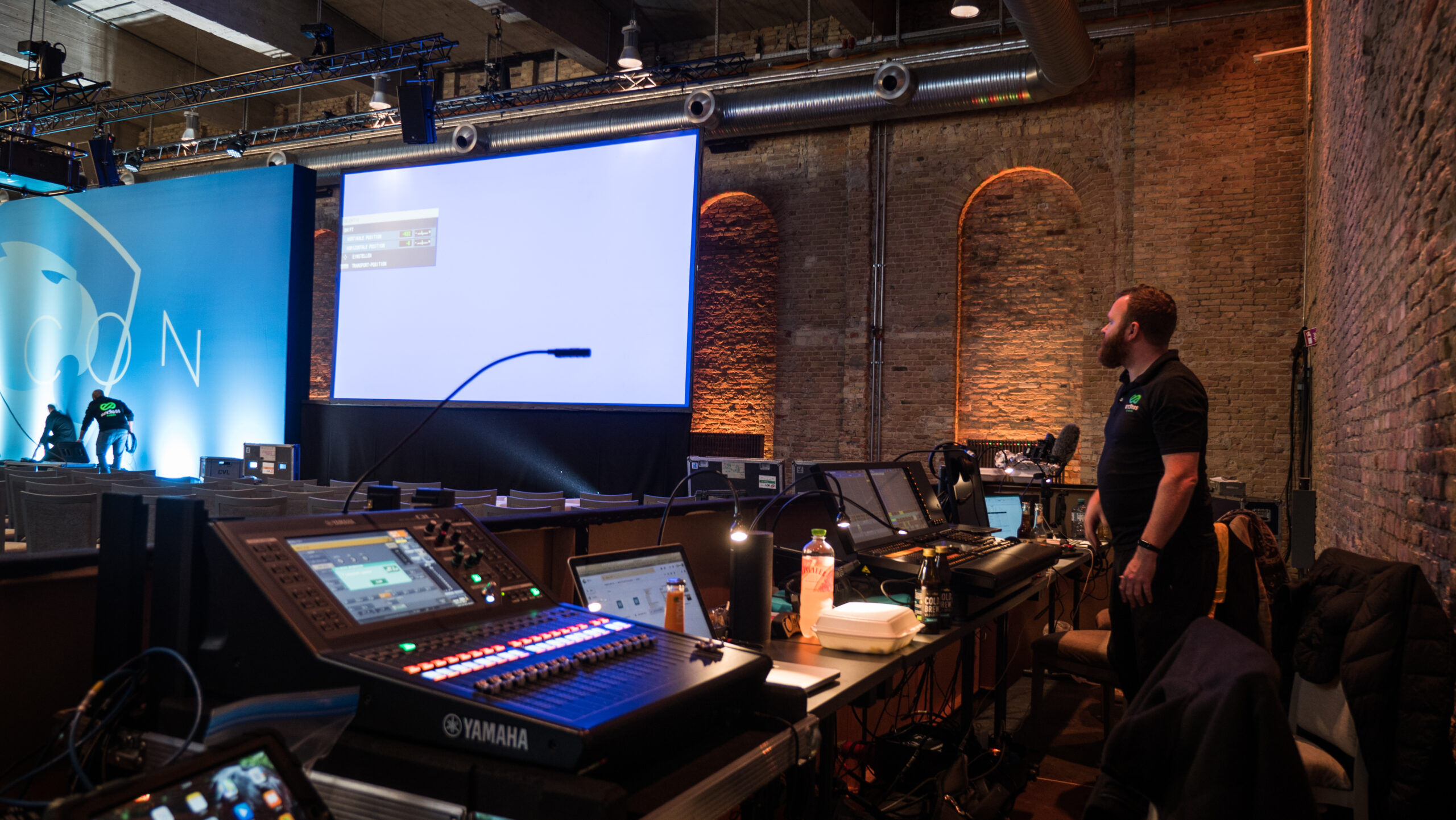Just How Event Production Functions: A Comprehensive Check Out the Refine
Event production is a complicated and structured process that requires careful planning and implementation. It starts with developing clear goals and understanding the target audience. Each step, from budgeting to place option, plays a crucial role in ensuring success. As the process unravels, different aspects must straighten seamlessly. Yet, the nuances of this detailed procedure typically go unnoticed. What are the vital phases that add to a memorable event?

The Preliminary Preparation Stage
When starting on event production, mindful planning is vital to guarantee an effective end result. The initial preparation phase acts as the foundation for all subsequent efforts. Throughout this phase, event producers must specify the event's purpose and goals clearly. Determining the target market aids customize the experience and messaging, ensuring importance and engagement.Producers have to additionally consider the event layout, whether it be in-person, digital, or hybrid, as this will certainly affect numerous logistical components. Choosing an appropriate date and venue is crucial, as it affects availability and availability.Furthermore, assembling a dependable team is fundamental for separating duties and streamlining interaction. Developing a timeline with turning points assurances all tasks are finished on routine. This stage involves extensive research study, including determining potential obstacles and creating techniques to mitigate threats. Eventually, a well-structured initial preparation phase sets the tone for an effective event production journey.

Budgeting and Source Allotment
In event production, effective budgeting and resource allocation are important for success - event production charlotte. Establishing financial specifications sets the structure for all succeeding decisions, while source distribution approaches ensure that every part of the event is sufficiently sustained. Together, these components help preserve control over expenses and maximize making use of readily available resources
Developing Financial Parameters
Establishing monetary criteria is important to the success of any kind of event production, as it establishes the foundation for reliable budgeting and resource allowance. This procedure begins with defining the general spending plan, which encompasses all elements of the event, including location prices, event catering, and advertising. By recognizing available funds, event coordinators can focus on expenses and allocate resources as necessary. Additionally, it is important to perform comprehensive marketing research to prepare for possible costs and identify funding sources, such as sponsorships or ticket sales. Developing clear monetary criteria additionally help in threat monitoring, allowing planners to set apart backup funds for unanticipated expenditures. Inevitably, a well-defined budget functions as a roadmap, directing the event production team towards accomplishing their goals while preserving financial control.
Resource Distribution Strategies
Effective resource distribution approaches are crucial for taking full advantage of the effect of an event while adhering to budget constraints. Successful event production requires a thorough strategy to budgeting and source allowance. Coordinators should prioritize essential components such as venue, food catering, and innovation, guaranteeing that funds are allocated to locations that improve attendee experience. A detailed spending plan must detail expected expenditures and determine areas for possible expense savings, such as negotiating with suppliers or checking out sponsorship chances. Furthermore, tracking expenditures throughout the preparation process aids prevent overspending. By using calculated resource circulation, event manufacturers can supply a remarkable experience while preserving financial duty, inevitably adding to the total success of the event.
Location Choice and Logistics
Selecting the appropriate location is vital to the success of any event, as it establishes the phase for the general experience. Place selection entails evaluating different factors, consisting of capacity, access, and place. Organizers must think about the target market and the nature of the event, guaranteeing the location straightens with the event's goals.Logistics play a significant duty in this procedure, involving plans for seats, audiovisual tools, and catering services. An appropriate place ought to assist in smooth circulation for attendees and staff, improving engagement.Additionally, assessing possible venues for facilities like car park, washrooms, and emergency situation leaves is important for security and comfort. The timeline for protecting the place is additionally critical, as popular locations may reserve swiftly - event production charlotte. Subsequently, detailed planning and timely execution can ultimately add to a seamless event experience, making venue choice and logistics essential elements of successful event production
Creative Concept Development
While the place establishes the physical phase, innovative idea development shapes the event's identification and story. This procedure starts with determining the event's purpose and target audience, permitting event manufacturers to develop a compelling theme that reverberates with participants. Conceptualizing sessions commonly include diverse viewpoints, promoting ingenious ideas that straighten with the event's goals.Once a style is established, visual aspects such as color schemes, signage, and decor are made to improve the overall ambience. Narration methods may likewise be integrated to develop an appealing journey for individuals, guaranteeing a remarkable experience. Furthermore, considerations regarding amusement, activities, and interactive components are lined up with the chosen idea, reinforcing the style throughout the event.Ultimately, effective imaginative idea growth assurances that every facet of the event works cohesively, leaving a long-term perception on participants and satisfying the event's purposes. This foundational job lays the groundwork for succeeding planning and implementation phases.
Working together With Suppliers and Providers
Successful event production rests on efficient partnership with vendors and suppliers. Selecting dependable companions, working out contracts properly, and making sure timely deliveries are important action in this process. Each of these elements contributes considerably to the total success and smooth implementation of an event.
Picking Reliable Allies
How can event coordinators ensure a smooth production experience? Selecting reputable partners is essential in accomplishing this goal. Event coordinators should conduct thorough research to recognize vendors and vendors with a proven record of quality. This includes checking referrals, assessing portfolios, and examining consumer feedback. Coordinators should prioritize companions that demonstrate expertise, timely communication, and a readiness to collaborate. Building solid partnerships cultivates trust and enables quick analytical throughout the event. Furthermore, it is advantageous to choose regional vendors that recognize the venue and regional logistics. Ultimately, a successful event rests on the harmony in between planners and their partners, guaranteeing that every element of production runs smoothly and effectively.
Negotiating Contracts Effectively
Effective settlement of contracts is an important step in the cooperation between event planners and their vendors and suppliers. This process involves clear interaction of assumptions, deliverables, and timelines. Coordinators need to conduct extensive research study on market rates and industry standards to develop a baseline for settlements. It is essential to create a joint ambience, motivating open dialogue about terms, rates, and prospective contingencies. Organizers must likewise prioritize recognizing the supplier's capabilities and constraints to align their demands properly. Adaptability can result in equally useful agreements, fostering long-lasting relationships. Crafting distinct contracts that include specific performance metrics can aid guarantee liability, eventually leading to effective event execution and satisfaction for all events entailed.
Guaranteeing Prompt Shipments
Prompt deliveries are essential for the smooth execution of any event, needing attentive collaboration in between planners and their vendors and distributors. Efficient communication is vital, as it aids establish clear assumptions pertaining to shipment schedules, amounts, and particular demands. Organizers typically produce comprehensive timelines to outline crucial milestones, making sure all Learn More celebrations stay lined up throughout the process. Routine check-ins with suppliers can help recognize possible hold-ups early, enabling proactive options. In addition, building strong connections with trusted vendors fosters trust fund and accountability, which can result in better service and prioritization. By prioritizing these collaborative efforts, coordinators can reduce disturbances, thereby enhancing the total performance of event production and ensuring that all necessary products and solutions show up as planned.
Marketing and Promo Approaches
While organizing an occasion, the success of marketing and promotion approaches can considerably influence presence and interaction. Effective approaches usually consist of a mix of electronic advertising, conventional advertising and marketing, and grassroots outreach. Using social media systems allows for real-time communication and targeted advertising and marketing, getting to certain demographics effectively. Email advertising and marketing campaigns can additionally engage potential attendees with individualized content and reminders.Collaborations with influencers or market leaders can additionally enhance credibility and broaden reach. Developing interesting material, such as video clips or blog sites, helps to produce buzz and receive passion leading up to the event. Additionally, leveraging early-bird discount rates and unique rewards can incentivize ticket purchases.Promoting with typical channels, such as posters or local media, stays pertinent, specifically in community-focused events. An extensive strategy that integrates multiple methods warranties optimum presence and engagement, ultimately adding to the event's success and the development of an unforgettable experience for participants.
On-Site Implementation and Monitoring
On-site implementation and monitoring are essential components that identify the general success of an event. Effective control during the event guarantees that all elements align with the planned agenda. Event managers oversee logistics, consisting of supplier control, tools arrangement, and visitor services. Checking timelines and resolving any kind of unforeseen issues are fundamental for maintaining a smooth experience.The team plays a considerable function, as trained employees are accountable for numerous jobs such as registration, information circulation, and technical support. Interaction among team participants is vital; it promotes a collaborative setting and allows quick resolution of challenges.Additionally, safety and security procedures should be abided by, securing the health of all guests. Post-event assessments are additionally part of on-site monitoring, supplying insights for future renovations. By focusing on these facets, event manufacturers can produce memorable experiences that satisfy or exceed guest expectations while accomplishing the event's purposes.
Often Asked Inquiries
Exactly how Do I Pick the Right Event Motif?
Picking the appropriate event motif entails taking into consideration the target audience, event function, and venue. Researching existing patterns and gathering input from stakeholders can additionally influence innovative concepts that resonate and create a remarkable experience.

What Prevail Errors in Event Production?
Typical mistakes in event production often consist of insufficient preparation, bad communication amongst team participants, budget plan mismanagement, overlooking to think about the audience's needs, and stopping working to conduct a comprehensive post-event analysis for future enhancements.
Just How Can I Determine Event Success?
To gauge event success, one can evaluate participant fulfillment, engagement levels, spending plan adherence, and post-event feedback. Trick efficiency signs, such as ticket sales and social click here to read media sites interactions, likewise provide useful understandings into general performance.
What Should I Do if It Rains on the Event Day?
In the event of rainfall on the day, the coordinator ought to carry out contingency plans, such as protecting outdoors tents or moving activities indoors. Interaction with participants about modifications is Clicking Here crucial to guarantee a smooth experience despite weather condition obstacles.
How Can I Make Certain Attendee Interaction During the Event?

Comments on “Make your audience the star with these event production charlotte methods”